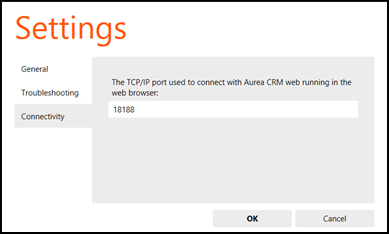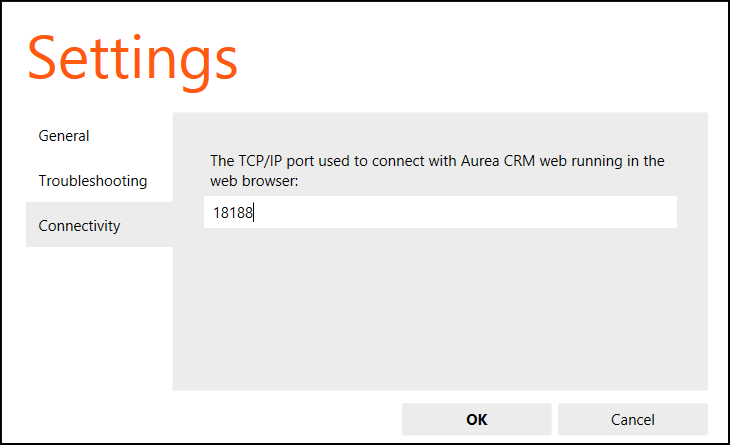Troubleshooting CRM.launcher issues
Learn to troubleshoot CRM.launcher issues.
Below are the commonly observed issues with the CRM.launcher and their solutions:
Certificate errors
Sometimes the CRM.launcher cannot authenticate itself with the CRM.Web server because of faulty certificates. This could be one of two reasons:
- A security policy might be preventing the launcher from getting and adding the correct certificate to the windows certificate manager.
- CRM.launcher has an old certificate from a previous launcher version.
Solution:Delete the current certificate from the "Windows Certificates Manager", and restart the CRM.launcher. It should acquire the latest certificate and use it for authentication.
- Message - “Cannot load external certificate <path to pfx file set in
.config file>”
Reason – This message is issued when you are using your own certificates and the
pfxcannot be accessed or does not exist.Solution – Ensure that the .config file for the CRM.launcher contains the correct path to the certificates. For more information on configuration files, see Configuring the CRM.launcher.
- Message – “Cannot load embedded certificate.”
Reason – This can be caused by a faulty installer, which did not have the default certificate embedded in it.
Solution – Reinstall the CRM.launcher using the latest copy from the support site.
- Message – “Failed to add CRM.launcher embedded certificate to the
certificate store. <detailed description>.”
Reason – The <detailed description> usually contains the reason for this kind of error and can vary from system to system. Two reasons commonly encountered are described below and solutions provided:
- The user that is running the CRM.launcher has limited rights and cannot add the certificate to the certificate store.
- The user cancels the certificate installation from the confirmation dialog box.
Solution – Check the detailed description provided and check with your system administrator for a solution as these errors are system specific. For the two reasons listed above, the solutions are as follows:
- Expand the rights of the user to include permissions to add the certificate to the certificate store.
- Reinstall the CRM.launcher and ensure that you accept the installation of the certificate.
Port Conflicts
The default port used by CRM.launcher is 18188. If you are getting a port conflict, you can change the default port to another that does conflict with other applications.
To change the port settings perform the following:
- Right click on the CRM.launcher icon (
 ) in the system tray. It displays the
context menu.
) in the system tray. It displays the
context menu.
- Select Settings. The CRM.launcher settings window
opens.

- Click Connectivity.

- Enter the new port number in the text box and click OK.
IE security policy denies websocket communication with localhost
If you are using Internet Explorer, its security policy might prevent communication with the CRM.launcher server running on the localhost. To work around this, perform the following steps:
- Set
<EnableIELocalhostWebsocketCommunication>in the update.launcher.exe.configfile, as shown in the code snippet below:
If set to true, on startup, the CRM.launcher service ensures that the IE policy is configured to allow websocket communication with the localhost. All flags in all the CRM.launcher configuration files are updated and set to true. If this setting is not configured at all, then all flags in all the CRM.launcher configuration files are set to false.
- If the
<EnableIELocalhostWebsocketCommunication>setting is enabled and set to true then the Connectivity tab in the CRM.launcher settings window shows the “Launcher localhost is trusted by Internet Explorer for websocket communication option as checked. See the screenshot below. It is not checked if the<EnableIELocalhostWebsocketCommunication>setting is not enabled at all. Note: To open the Settings window, right click on the CRM.launcher client icon (
Note: To open the Settings window, right click on the CRM.launcher client icon ( )
running in the system tray, and select Settings….
)
running in the system tray, and select Settings….
If you wish to disable or enable websocket communication between the Internet Explorer
and the localhost then you can do it from the above settings window by unchecking and
checking the the Launcher localhost is trusted by Internet Explorer for
websocket communication option in the settings window. This is valid only
for the current session. In the next session, when the CRM.launcher service is started
up, the configured setting is activated again. For example, if the
<EnableIELocalhostWebsocketCommunication> setting is enabled
and set to true and you had disabled websocket communication with localhost by
unckecking the option in the Settings window, then the new session has the websocket
communication enabled.